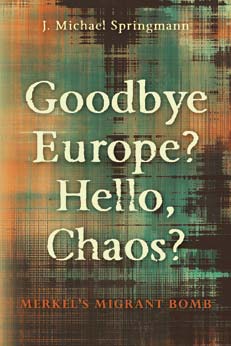
Chaos from the mass migration is a deliberate strategy. (Photo: Janossy Gergely, Shutterstock)
By Barrie Zwicker (Special to Truth and Shadows)
The refugee crisis in Europe, the largest seen since World War 2, is no accident.
Former U.S. State Department official J. Michael Springmann addresses this verboten subject in his just-released second book Goodbye Europe? Hello, Chaos?: Merkel’s Migrant Bomb. He argues that these refugees and migrants were deliberately created by the American Empire to be used as political weapons.
The misery of asylees, Springmann writes, is one of the planned outcomes of horrendous and unlawful military attacks on Syria and other countries. These are carried out in proxy wars by “the West,” including Israel. Springmann writes that Israel “is a terrorist entity” and “an ever helpful architect of chaos.”
Overall the design is to advance the interests of the American Empire. The resulting chaos is cold-blooded strategy. Springmann offers evidence that the Empire has greased the skids for the traumatized asylum seekers. For instance this technical but telling factoid:
CISCO’s Tactical Operations (TacOps) team supported by the volunteer Disaster Response Team (DRT) from the U.K. and Ireland, Google, and NetHope have installed Meraki-based Wi-Fi networks and device charging stations at more than 17 sites along the migration route in Southern and Central Europe. [my emphasis]
 Springmann provides many
Springmann provides many  other facts to buttress his contention that the “migrant millions” are human pawns. The reference to NetHope, by the way, is significant. NetHope and Mercy Corps “have backgrounds tied to the US government,” he writes. “NetHope is a shadowy organization headquartered in CIA-friendly Fairfax County, Virginia.” Springmann, who also has a background working for NGOs, names other suspect NGOs that play their role in the overall coerced migration. One of the motives is to destabilize Europe as an economic challenger to the U.S.A.
other facts to buttress his contention that the “migrant millions” are human pawns. The reference to NetHope, by the way, is significant. NetHope and Mercy Corps “have backgrounds tied to the US government,” he writes. “NetHope is a shadowy organization headquartered in CIA-friendly Fairfax County, Virginia.” Springmann, who also has a background working for NGOs, names other suspect NGOs that play their role in the overall coerced migration. One of the motives is to destabilize Europe as an economic challenger to the U.S.A.
Verboten is the right word. Springmann speaks German, having spent five years in Stuttgart working for the State Department. He also worked for the department in Jeddah, Saudi Arabia, where he saw close-up how the Empire recruits prospective terrorists, sends them to the U.S. for terror training and deploys them in proxy wars. That experience provided him with the damning fodder for his first book, Visas for Al Qaeda: CIA Handouts That Rocked the World, reviewed on this blog two years ago this month.
“At Jeddah,” Springmann wrote in Visas for Al Qaeda, “to the best of my knowledge, out of some twenty US citizens assigned to the consulate, only three people, including myself, worked for the Department of State. The rest were CIA or NSA officials or their spouses.” Elsewhere in that book Springmann suggests that essentially the CIA runs the State Department, and that this is true of many other U.S. government departments and agencies as well.

Springmann: blames Merkel.
Springmann brings evidence to bear on his contention that German Chancellor Angela Merkel is a scheming author of unnecessary misfortunes in the form of the largest influx of migrants to any European country. At one point he holds her entirely to blame for this. (“It was Merkel and her government who invited all the feared Islamists into the country.”) Yet contradictorily Springmann overall lays the blame squarely on the American Empire.
That she’s such a baddie is also hard to square that with what is known about her overall. She’s earned the nickname “Chancellor of the World” and appears more dedicated to peace and understanding than most of her peers, by a long shot.
What Germany’s “V-men” do is likely not within her perfect control. The V-men come in for criticism by Springmann. The term comes from the German for a trusted person, Vertrauensmann. They’re really secret police. Hitler was recruited to be a “V” man while he was in the World War I postwar army.
The book is not without prosaic shortcomings. Apart from whether Merkel is as large a villain as Springmann suggests, there are some questionable alleged facts and insupportable generalizations.
Springmann includes a number of reports of alleged behaviours by migrants in Europe, from theft to sexual and other violent assaults, including rape and murder. His usual footnotes pointing to reliable sources dry up in regard to some of these reports. One example is a quote from the tabloid Bild that in 2015 “migrant misdeeds” in Germany numbered 208,344—or 23 crimes per hour. The paper said it got the number from a confidential police report that it was given exclusively. Worth noting is that the eminent German author Heinrich Boll wrote in an essay that what Bild does “isn’t cryptofascist anymore, not fascistoid, but naked fascism. Agitation, lies, dirt.” That is from a Wikipedia entry.
The emotional impact of most of these Bild reports leaves this reviewer with understandable skepticism. Are some of these examples of the very deceptions Springmann in other parts of the book decries? This reviewer encountered one of these fake reports in January 2016 and wrote a letter to the editor of The Globe and Mail about it, which was published. It read in part:
An exacerbating factor in the divide over refugees is the insertion of disinformation by the right into the situation. An example is cited in Der Spiegel on Jan. 5, headlined The Case of the Murdered Goats: Exploring Germany’s Far-Right Rumour Mill.
Reporters investigated “outrage over an incident in the eastern German town of Lostau. Locals had accused refugees of plundering a petting zoo, slaughtering some goats and eating them around a campfire.”
The story, said the writers, “aimed directly at the heart of German animal lovers, taxpayers and immigration opponents. But there was just one problem: It wasn’t true.
It turns out that there hadn’t been a petting zoo in Lostau for years. And this was just one example among many.
Valuable as it is, this book also is in places a cautionary tale about making sweeping generalizations. One example must suffice. On page 181 we find this:
If people forget their history, reject their heritage, and dismiss their identity, then why object to aliens changing European culture?
The peoples of Europe understand this. Their leaders don’t. Those want to cobble together a new multicultural Europe, erasing the one that already exists. And, so far, the replacement doesn’t work and likely can’t be made to work—except in the minds of the globalists. The people vigorously oppose these government policies. They denounce their leaders’ abandoning constitutional obligations to defend their country’s borders, territorial integrity, and democracy.
The generalizations here include “peoples of Europe” who “understand this,” “replacement doesn’t work,” “the people vigorously oppose,” and “they denounce…” It’s reminiscent of Theresa May’s repeated contention that “the people of Britain voted for” Brexit when in fact the vote was close to 50-50.
These generalizations lead Springmann to make an assessment that was understandable even a few months ago, namely that (essentially right wing) nationalism remains in an upward trajectory.
But since he wrote that, Macron, ostensibly a centrist and probably a globalist, has risen fast in France. Springmann writes on page 184 that “the left’s policies are clearly bankrupt” and “the left has no plan” on page 185. Yet Jeremy Corbyn, very to the left, scored heavily against Theresa May with specific plans. UKIP is dead in the water, obtaining two per cent of the votes in the British election. The story of right wing populism is not paved with certainty, even if right wing populists are certain they’re right.
There are two lesser shortcomings. One is an occasional lack of copy editing. For instance, about half of page 19 is devoted to the arrest by North Rhine-Westphalia police of “five members of a ‘terrorist recruiting network.’” On page 177 the same half page of text is repeated almost word for word.
In his email to me to which the pdf file of his book was attached, Springmann offered this:
Easier to write than the first but much harder to edit. Could have spent more time on it but thought with European elections was so timely I needed to get it out.
Understandable. Today there’s justification for more “instant books” containing vital perspectives, which this one contains. But instantaneity carries prices. I think they’re worth paying. A second edition could solve a lot.
In other places Springmann repeats information, but he says he is doing so. And I’m with him on that. Repetition is a pillar of effective communication. This pillar should not be at the disposal of the merchants of lies only.
Another format flaw that could have been avoided with the aid of a competent editor is that some material is misplaced. The most obvious example is at the end, where the conclusions are offered but not really found. Instead, his important conclusions, referred to earlier in this review, are found in the body of the book. An interested reader will encounter them where they are.
These failings are more than counterbalanced by the damning evidence and the damning perspective Springmann brings to the table, based on his life experiences working within different sectors of the American Empire and his wide-ranging research. Four stars out of five.
First of my responses to Barrie’s article:
German newspapers reporting increase in migrant crime besides Bild: Frankfurter Allgemeine; Stuttgarter Zeitung; Kronen Zeitung (Austria); Sueddeutsche Zeitung.
Thanks for that additional information. Michael Springmann’s book deserves attention for many reasons. One is that it should help anyone overcome a particular challenge of comprehension, namely that there are seemingly spontaneous, unplanned dramatic events that are in fact strategically planned events.
The emotionally-wrenching photo of three-year-old Alan Kurdi’s body, washed up on a Turkish beach, was tragic iconic proof that even small children are victims of scheming imperialist adults, whose own children remain safe and sound so that they can go on to be enrolled at expensive Western universities where they will become the next generation of scheming imperialist adults.
The fuller story of how little Alan came to drown is complicated. (https://www.express.co.uk/comment/expresscomment/604590/Migrant-crisis-the-truth-about-the-boy-the-beach-Aylan-Kurdi) But the root cause of the complications are the basic machinations of “the West,” as Springmann makes clear.
Some of the flaws, as I see them, of Michael’s book arise from the sense of urgency he felt in trying to explain that larger picture of the biggest migrant crisis since 1945. The German and other media have been complicit in using this Western-made crisis to advance the Islamophobic so-called “war on terror.” Bild and the other German outlets named by hausfrauleaks have their counterparts all over “the West.”
The illicit, mis-named “war on terror,” it seems to me, along with the Russophobic continuation of the century-long capitalist antagonism to the Russian revolution and all that followed from it, is the last gasp of Western imperialism. Trouble is, we may all be condemned to our last gasps before it is over.
On this important topic, Irish Communist Gearóid Ó Colmáin has a major contribution in his 11-part series of articles on Dissident Voice, ‘Coercive Engineered Migration: Zionism’s War on Europe’. For example, Ó Colmáin writes of how Marx & Engels also confronted the ‘mass migration’ weapon in the 1800s … and they totally opposed such schemes as destructive of the working class, an oligarch tool of conflict-creation & worker de-moralisation.
US Pentagon advisor & former John Kerry staffer Kelly M Greenhill, wrote a 2011 book on ‘Weapons of Mass Migration’ describing what is being done to Europe today … Greenhill recommended artificially-induced mass migrations as an excellent strategy to divide & control societies … She documented 59 examples of refugees being used as weapons since the Second World War
In these times, I think ‘truthers’ need to consider … publishing a book, is not the way to ‘expose the truth’ about an issue, it is more of a way to bury the truth, given how few people read or buy books (or can even afford to buy them) … it is a bit of an old-timer fetish to ‘write a book’ … today it’s better to get the key points on the web … even with running the gauntlet of censorship, search result manipulation, & outright lies by the CIA’s Google & Wikipedia criminals, you have a better chance of getting the word out to those who have ears to hear … Ó Colmáin’s 11-part series could have been a ‘book’ but lots of us have read him, whilst we won’t be seeing the tome reviewed above